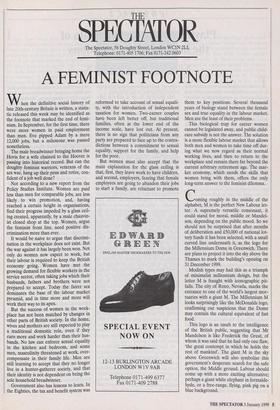SPECT THE AT OR
The Spectator, 56 Doughty Street, London WC1N 2LL Telephone: 0171-405 1706; Fax 0171-242 0603
A FEMINIST FOOTNOTE
When the definitive social history of late 20th-century Britain is written, a statis- tic released this week may be identified as the footnote that marked the end of femi- nism. In September, for the first time, there were more women in paid employment than men. Eve pipped Adam by a mere 12,000 jobs, but a milestone was passed nonetheless.
The male breadwinner bringing home the Hovis for a wife chained to the Hoover is passing into historical record. But can the doughty feminist warriors, veterans of the sex war, hang up their pens and retire, con- fident of a job well done?
Not according to a new report from the Policy Studies Institute. Women are paid less than men for comparable jobs, are less likely to win promotion, and, having reached a certain height in organisations, find their progress impeded by a glass ceil- ing created, apparently, by a male chauvin- ist closed shop at the top. Women, argue the feminist front line, need positive dis- crimination more than ever.
It would be naive to argue that discrimi- nation in the workplace does not exist. But the war against it has largely been won. Not only do women now expect to work, but their labour is required to keep the British economy going. Women have met the growing demand for flexible workers in the service sector, often taking jobs which their husbands, fathers and brothers were not prepared to accept. Today the fairer sex dominates the base of the labour market pyramid, and in time more and more will work their way to its apex. But the success of women in the work- place has not been matched by changes in other parts of British society. In the home, wives and mothers are still expected to play a traditional domestic role, even if they earn more and work harder than their hus- bands. No law can enforce sexual equality in the kitchen and bedroom, and some men, masculinity threatened at work, over- compensate in their family life. Men are still learning to accept that they no longer live in a hunter-gatherer society, and that their identity is not dependent on being the sole household breadwinner.
Government also has lessons to learn. In the Eighties, the tax and benefit system was reformed to take account of sexual equali- ty, with the introduction of independent taxation for women. Two-earner couples have been left better off, but traditional families, often at the lower end of the income scale, have lost out. At present, there is no sign that politicians from any party are prepared to face up to the contra- dictions between a commitment to sexual equality, support for the family, and help for the poor.
But women must also accept that the main explanation for the glass ceiling is that, first, they leave work to have children, and second, employers, fearing that female employees are going to abandon their jobs to start a family, are reluctant to promote them to key positions. Several thousand years of biology stand between the female sex and true equality in the labour market. Men are the least of their problems.
This biological trap for career women cannot be legislated away, and public child- care subsidy is not the answer. The solution is a more flexible labour market that allows both men and women to take time off dur- ing what we now regard as their normal working lives, and then to return to the workplace and remain there far beyond the current arbitrary retirement age. The mar- ket economy, which needs the skills that women bring with them, offers the only long-term answer to the feminist dilemma.
Coming roughly in the middle of the alphabet, M is the perfect New Labour let- ter. A supremely versatile consonant, it could stand for moral, middle or Mandel- son, depending on the public mood. So we should not be surprised that after months of deliberation and £50,000 of national lot- tery funds it has been selected, with a small curved line underneath it, as the logo for the Millennium Dome in Greenwich. There are plans to project it into the sky above the Thames to mark the building's opening on 31 December 1999.
Modish types may hail this as a triumph of minimalist millennium design, but the letter M is fraught with iconographic pit- falls. The city of Reno, Nevada, marks the entrance to one of the world's largest mor- tuaries with a giant M. The Millennium M looks surprisingly like the McDonalds logo, confirming our suspicions that the Dome may contain the cultural equivalent of fast food.
This logo is an insult to the intelligence of the British public, suggesting that Mr Mandelson is like Frederick the Great, of whom it was said that he had only one flaw, `the great contempt in which he holds the rest of mankind'. The giant M in the sky above Greenwich will also symbolise this government's desperate search for the safe option, the Middle ground. Labour should come up with a more exciting alternative; perhaps a giant white elephant in formalde- hyde, or a free-range, flying, pink pig on a blue background.


















































 Previous page
Previous page